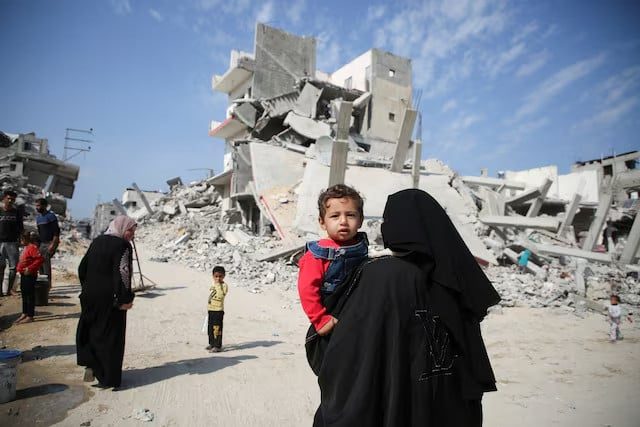Khaled Dasouso, a shop owner in Gaza, voiced this sentiment, suggesting that Palestinians need to recognize the US as a steadfast ally of Israel

News Desk
JERUSALEM: The re-election of Donald Trump to the White House has prompted significant reactions among Palestinians, who fear further destabilization in the already tense region. Many Palestinians in Gaza, still reeling from relentless Israeli bombardments, worry that Trump’s previous policies favoring Israel might intensify if he returns to power. This sentiment is echoed by Abu Osama, a displaced resident of Khan Younis in Gaza, who described Trump’s victory as a potential “new catastrophe” for Palestinians, raising concerns of increased political and social strife.
Health authorities in Gaza report a staggering death toll of over 43,300 Palestinians within the past year alone, a grim testament to the ongoing devastation since the conflict escalated on October 7, 2023, after a major Hamas-led incursion into Israel. The leaders of both Hamas and the Palestinian Authority (PA) have issued statements directed at Trump, urging him to prioritize peace. Hamas, which has historically received minimal support from previous US administrations, called for an end to the US’s “blind support” for Israel and encouraged Trump to “learn from Biden’s mistakes.”
Meanwhile, Palestinian President Mahmoud Abbas, leader of the PA and a longstanding rival of Hamas, extended a diplomatic message of congratulations to Trump, expressing hope that the new administration could support Palestinian aspirations and stability. Trump’s previous term saw a controversial stance with his recognition of Jerusalem as Israel’s capital—a move widely viewed by Palestinians as a significant bias. This has left many Palestinians skeptical about Trump’s potential influence on the peace process. Khaled Dasouso, a shop owner in Gaza, voiced this sentiment, suggesting that Palestinians need to recognize the US as a steadfast ally of Israel.
Efforts by Biden’s administration and intermediaries like Qatar and Egypt have not yet succeeded in establishing a ceasefire or securing the release of hostages, raising further uncertainties. As Palestinians brace for what they anticipate to be a politically challenging period, Trump’s upcoming policies on the Middle East may significantly shape the course of Israeli-Palestinian relations once more.



